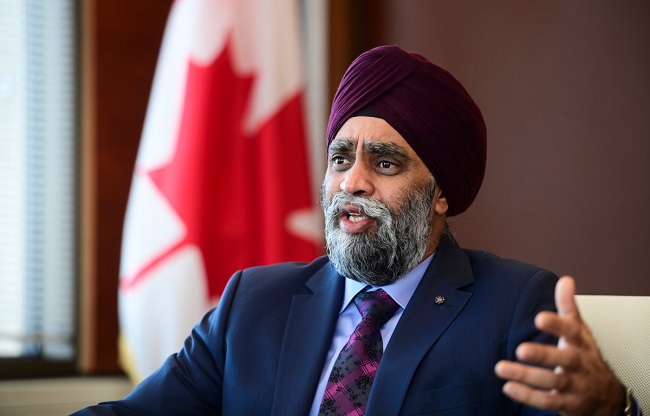A project in Nigeria that turns plastic pollution into designer textiles and accessories, buy-back schemes to help women and young people earn money through recycling, and a project that turns plastic waste into school benches in Rwanda are finalists in the running to win £1 million in the first strand of the Afri-Plastics Challenge.

Other innovations in contention for the Accelerating Growth strand of the Afri-Plastics Challenge are:
- 1. Mega Gas Alternative Energy in Kenya which uses a thermal cracking process to convert plastic trash into clean cooking gas for people living on less than a dollar a day;
- 2. A scalable community recycling programme from Chaint Afrique Academy on the shores of Lake Volta in Ghana to prevent waste entering the marine ecosystem, and;
- 3. The Full Development Agency in the city of Bukavu, DR Congo, creating building materials from plastic waste to improve the urban environment.
Harjit Sajjan, Minister of International Development, Government of Canada, said: “I look forward to see how each of the finalists’ projects develop and grow in the year ahead. As custodians of the longest coastline in the world, our responsibility to the health of the oceans does not stop at the edge of Canada’s waters. The global marine ecosystem is complex and deeply interconnected – plastic pollution in sub-Saharan Africa has global consequences once it enters lakes, rivers and the ocean.
The 15 inspiring finalists of the Afri-Plastics Challenge: Accelerating Growth strand are leading the way in successfully tackling the enormous quantities of plastic pollution being produced across Africa through ingenious and community-focussed projects that have great potential to scale across the continent and beyond.
These finalists have been selected from 30 semi-finalist teams announced in November 2021. Each has already received grants of £10,000 to grow their ideas and demonstrate their scalability in advance of judging. The 15 finalists will now receive a further £100,000 each to advance their solutions to plastic waste management.
Three winners will be announced in March 2023 – first place will be awarded £1 million, second place will be awarded £750,000 and third place will be awarded £500,000.
Strand two semi-finalists announced
The Afri-Plastics Challenge is tackling the scourge of plastic pollution in sub-Saharan Africa on multiple fronts, with three active strands rewarding innovators:
- Strand 1 – Accelerating Growth –15 finalists announced today – is rewarding innovative solutions to managing plastic waste after it has been used and discarded (i.e., downstream solutions).
- Strand 2 – Creating Solutions – 25 semi-finalists announced today – is rewarding innovative solutions to reducing the volume of plastic in packaging and other products before it is used (i.e., upstream solutions).
- Strand 3 – Promoting Change – launched in December 2021 – is seeking creative campaigns and projects to influence behaviour change among individuals and communities to promote sustainable consumption around plastic.
In addition to the 15 finalists in the Accelerating Growth strand, the Afri-Plastics Challenge has selected the 25 semi-finalists in the Creating Solutions strand.
Each semi-finalist will be supported with a £25,000 grant and additional expert support to develop and validate their solutions. From these semi-finalists, 10 finalists will be selected in June 2022. Finally in January 2023, three winners will be chosen, with first place being awarded a further £750,000, second place awarded £250,000 and third place awarded £100,000.
Solutions through to the semi-finals of Strand 2 come from across sub-Saharan Africa, with many developing plant- and nature-based alternatives to plastics in everything from food packaging to construction materials. Several semi-finalists are developing sustainable and plastic-free sanitary products for women and others are working on safe drinking water alternatives that don’t rely on single-use plastic bottles.
Matthew Haden, Founder, The Recycler Tanzania and Afri-Plastics Challenge judge, said:“The world needs to significantly reduce the quantities of plastic that are used in products and packaging if it is to hold back the tidal wave of plastic pollution that is wrecking environments on land and in water.
“Today’s semi-finalists are at the cutting-edge of innovation in sub-Saharan Africa, creating the home-grown solutions that empower communities to stem the growing problem of plastic waste, and delivering business solutions that have the export potential to cross borders and make a difference to people around the world.”
